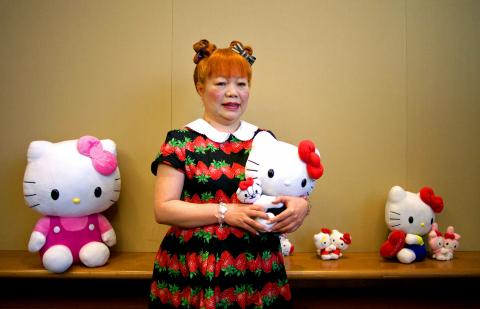The flamboyant designer of Japanese cartoon and global mega-brand Hello Kitty defended the cute cat against new rivals yesterday as the character prepares to celebrate her 40th birthday.
Speaking on the sidelines of the Hong Kong Book Fair, Yuko Yamaguchi took the concept of life imitating art to another level, wearing a Kitty-style strawberry dress with dyed auburn hair piled into two buns topped with a red ribbon — the cat’s signature accessory.
As Kitty enters her next decade, she faces increasing competition from more cutting-edge cartoons like Brown and Cony, the bear and rabbit mascots of Tokyo-based messaging app Line, which has taken Asia by storm in recent months. However, Yamaguchi insisted Kitty would cope with growing older in a digital age.

Photo: AFP
“There are new cartoon characters that are coming out daily... [but] I think Hello Kitty is the only one that can adapt to the changes in the world,” Yamaguchi said.
The moon-faced mouthless white cat first appeared in 1974 on a coin purse in Japan and has since built up a worldwide fan base, appearing on everything from handbags to sex toys.
Her image is licensed by Japanese company Sanrio, which says on its Web site that it makes more than US$5 billion in retail sales each year. Hello Kitty is its flagship brand. Yamaguchi, who was at the Hong Kong fair to tie in with its new Japan Pavilion, has been the lead designer of Hello Kitty since 1980 and promotes herself as the character’s best friend.
“She is very motivated and open and wants to face the future,” she says of the character.
There are plenty of detractors of Hello Kitty’s sweetness — entire blogs are dedicated to tearing down the cute icon, with online spoofs depicting her as a horror movie character.
However, Yamaguchi said her appeal can endure.
“There are already three generations of fans that like Hello Kitty, so I hope that there will be more fans like that in the future, like people in a family loving Hello Kitty together,” she said.
The main Hello Kitty 40th birthday celebrations will take place later this year, including the first ever fan convention, which is to be hosted in Los Angeles at the end of October.

Taiwan will prioritize the development of silicon photonics by taking advantage of its strength in the semiconductor industry to build another shield to protect the local economy, National Development Council (NDC) Minister Paul Liu (劉鏡清) said yesterday. Speaking at a meeting of the legislature’s Economics Committee, Liu said Taiwan already has the artificial intelligence (AI) industry as a shield, after the semiconductor industry, to safeguard the country, and is looking at new unique fields to build more economic shields. While Taiwan will further strengthen its existing shields, over the longer term, the country is determined to focus on such potential segments as

UNCERTAINTY: Innolux activated a stringent supply chain management mechanism, as it did during the COVID-19 pandemic, to ensure optimal inventory levels for customers Flat-panel display makers AUO Corp (友達) and Innolux Corp (群創) yesterday said that about 12 to 20 percent of their display business is at risk of potential US tariffs and that they would relocate production or shipment destinations to mitigate the levies’ effects. US tariffs would have a direct impact of US$200 million on AUO’s revenue, company chairman Paul Peng (彭雙浪) told reporters on the sidelines of the Touch Taiwan trade show in Taipei yesterday. That would make up about 12 percent of the company’s overall revenue. To cope with the tariff uncertainty, AUO plans to allocate its production to manufacturing facilities in

COLLABORATION: Given Taiwan’s key position in global supply chains, the US firm is discussing strategies with local partners and clients to deal with global uncertainties Advanced Micro Devices Inc (AMD) yesterday said it is meeting with local ecosystem partners, including Taiwan Semiconductor Manufacturing Co (TSMC, 台積電), to discuss strategies, including long-term manufacturing, to navigate uncertainties such as US tariffs, as Taiwan occupies an important position in global supply chains. AMD chief executive officer Lisa Su (蘇姿丰) told reporters that Taiwan is an important part of the chip designer’s ecosystem and she is discussing with partners and customers in Taiwan to forge strong collaborations on different areas during this critical period. AMD has just become the first artificial-intelligence (AI) server chip customer of TSMC to utilize its advanced

While China’s leaders use their economic and political might to fight US President Donald Trump’s trade war “to the end,” its army of social media soldiers are embarking on a more humorous campaign online. Trump’s tariff blitz has seen Washington and Beijing impose eye-watering duties on imports from the other, fanning a standoff between the economic superpowers that has sparked global recession fears and sent markets into a tailspin. Trump says his policy is a response to years of being “ripped off” by other countries and aims to bring manufacturing to the US, forcing companies to employ US workers. However, China’s online warriors